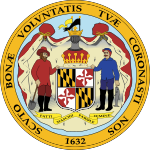A special election was held in Maryland's 2nd congressional district on May 5, 1794, to fill a vacancy left by the resignation of John Francis Mercer (A) on April 13, 1794
| Elections in Maryland |
|---|
 |
A special election was held in Maryland's 2nd congressional district on May 5, 1794, to fill a vacancy left by the resignation of John Francis Mercer (A) on April 13, 1794
| Candidate | Party | Votes [1] | Percent |
|---|---|---|---|
| Gabriel Duvall | Anti-Administration | 155 | 100% |
Duvall was seated November 11, 1794 [2]

The 3rd United States Congress was a meeting of the legislative branch of the United States federal government, consisting of the United States Senate and the United States House of Representatives. It met at Congress Hall in Philadelphia, Pennsylvania from March 4, 1793, to March 4, 1795, during the fifth and sixth years of George Washington's presidency.

The 1794–95 United States House of Representatives elections were held on various dates in various states between August 25, 1794, and September 5, 1795 (Kentucky). Each state set its own date for its elections to the House of Representatives before the first session of the 4th United States Congress convened on December 7, 1795. They were held during President George Washington's second term. Elections were held for all 105 seats, representing 15 states.
The 1795 United States Senate election in New York was held on January 27, 1795 by the New York State Legislature to elect a U.S. Senator to represent the State of New York in the United States Senate.

The 1792–93 United States Senate elections were held on various dates in various states, coinciding with President George Washington's unanimous re-election. As these U.S. Senate elections were prior to the ratification of the Seventeenth Amendment in 1913, senators were chosen by state legislatures. Senators were elected over a wide range of time throughout 1792 and 1793, and a seat may have been filled months late or remained vacant due to legislative deadlock. In these elections, terms were up for the ten senators in Class 2.

The 1794–95 United States Senate elections were held on various dates in various states. As these U.S. Senate elections were prior to the ratification of the Seventeenth Amendment in 1913, senators were chosen by state legislatures. Senators were elected over a wide range of time throughout 1794 and 1795, and a seat may have been filled months late or remained vacant due to legislative deadlock. In these elections, terms were up for the senators in Class 3.

The 1794 United States House of Representatives elections in New York were held on December 12, 1794, to elect ten United States Representatives to represent the State of New York in the United States House of Representatives of the 4th United States Congress.

The 18th New York State Legislature, consisting of the New York State Senate and the New York State Assembly, met from January 6 to April 9, 1795, during the eighteenth year of George Clinton's governorship, first in Poughkeepsie, then in New York City.

Elections to the House of Representatives were held in Pennsylvania on October 14, 1794, for the Fourth Congress.

Elections to the United States House of Representatives were held in Pennsylvania on October 11, 1796, for the 5th Congress.

The 1793 United States Senate special election in Pennsylvania was held on February 28, 1793. Albert Gallatin was elected by the Pennsylvania General Assembly to the United States Senate.

A special election was held in New Jersey's at-large congressional district on January 11, 1795 to fill a vacancy in the Third Congress left by the death of Abraham Clark (P) on September 15, 1794.
A special election was held in Connecticut's at-large congressional district on April 13, 1795, to fill a vacancy left by Jonathan Trumbull, Jr. (F)'s election to the Senate.

The 1794 United States Senate special election in Pennsylvania was held on March 31, 1794. James Ross was elected by the Pennsylvania General Assembly to the United States Senate.

A special election was held in North Carolina's 4th congressional district on August 4, 1795 to fill a vacancy left by the death of Alexander Mebane (DR) on July 5, 1795, before the start of the 1st session of the 4th Congress.

A special election was held in Maryland's 3rd congressional district on December 8, 1794, to fill a vacancy left by the resignation of Uriah Forrest (P) on November 8 of the same year.
A special election was held in South Carolina's 5th congressional district on October 13–14, 1794 to fill a vacancy left by the death of Alexander Gillon (A) on October 6, 1794.
The 1794 United States elections occurred in the middle of President George Washington's second term. Members of the 4th United States Congress were chosen in this election. Tennessee was admitted as a state during the 4th Congress. The election took place at the beginning of the First Party System, with the Democratic-Republican Party and Federalist Party emerging as political parties, succeeding the anti-administration faction and the pro-administration faction.

The Delaware United States Senate special election for 1795 was held on March 16, 1795. The former Senator George Read had resigned to take the position of Chief Justice of the Delaware Supreme Court. Henry Latimer defeated the former governor of Delaware, governor of Pennsylvania and Continental Congressmen from Delaware and Pennsylvania by one vote.